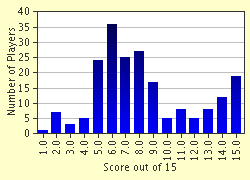Quiz Answer Key and Fun Facts
1. Hephaistion and Alexander are hailed as great ancient Greeks, but what province were they from?
2. To give Hephaistion his full patronymic, he would be Hephaistion son of ____?
3. Upon reaching manhood Hephaistion joined which prestigious unit of Alexander's army?
4. Hephaistion eventually rose to hold the second highest position in the empire, after Alexander's. What was this position called?
5. When Alexander entered Troy, he and Hephaistion paid tribute at the graves of which famous Greek companions?
6. After defeating the Persian king, Darius, at the Battle of Issus, Alexander found himself in possession of Darius' wife, daughter and mother. When he went to visit the women (with best friend in tow), Darius' mother Queen Sisygambis prostrated herself before Hephaistion instead of Alexander. Why did she do this?
7. To celebrate his victory over the Persians, Alexander married Stateira, Darius' oldest daughter. As a mark of honour, he married Hephaistion to Darius' second daughter. What was her name?
8. Did Hephaistion have children with his wife?
9. Hephaistion was, by some accounts, a hot-tempered and abrasive man. While on campaign in India, he came to blows with one of his rivals, a general who later became the co-regent for Alexander's son after the conqueror's death. Who was this rival?
10. In 327 BC Alexander entered India. Hephaistion, along with Perdikkas, was given charge of the majority of the army with instructions to reach and bridge the Indus River. Along the way, which famous landmark did Hephaistion take in?
11. Which of these unofficial titles did Alexander affectionately bestow on his friend?
12. After conquering the Persian city of Sidon, Alexander left Hephaistion in charge of the city, with orders to appoint a new local ruler. Hephaistion consulted with relevant Sidonites, and appointed a man named Abdalonymus, a descendant of the former kings of Sidon. According to legend, what was Abdalonymus doing when Hephaistion came across him?
13. In 323 BC, Hephaistion fell ill and died unexpectedly. In which city did he die?
14. It is not known conclusively what killed Hephaistion but there has been speculation that he was poisoned by his enemies at court. Another theory states that Hephaistion died because he stuffed himself with rich food against doctors' advice while suffering from fever. Both theories say that Hephaistion ate which items just before he died?
15. After Hephaistion's death, Alexander was famously stricken by grief, lavishing his dead friend with numerous honours. He was even said to have sent to the oracle of Amon asking for Hephaistion to be declared a god. What was the oracle's eventual decree?
Source: Author
tkane82
This quiz was reviewed by FunTrivia editor
fringe before going online.
Any errors found in FunTrivia content are routinely corrected through our feedback system.


